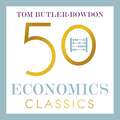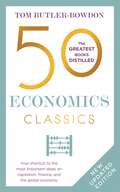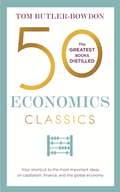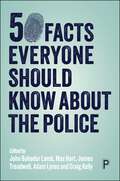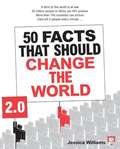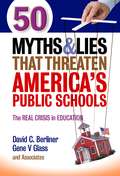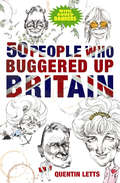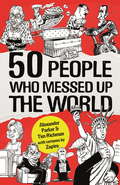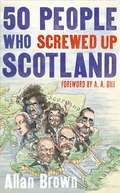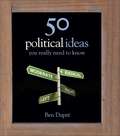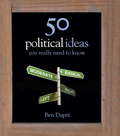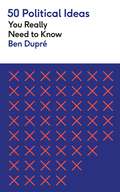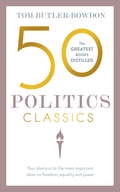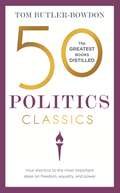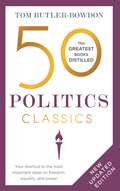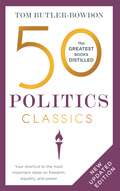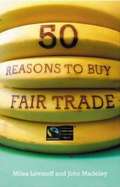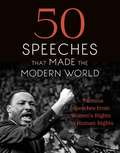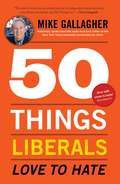- Table View
- List View
50 Economics Classics: Your shortcut to the most important ideas on capitalism, finance, and the global economy
by Tom Butler BowdonUnderstand the greatest books in Economics with the latest volume in the bestselling 50 Classics series.From Karl Marx to Naomi Klein, from The Wealth of Nations to Piketty's Capital, here are the 50 most important titles on finance and world economy distilled. 50 Economics Classics considers the legacy of some of the great names including Ricardo, Keynes, Malthus and Friedman, and highlights the work of newer writers including Piketty, Luigi Zingales and Enrico Moretti. It presents the most influential titles on finance and work economy, from JL Galbraith's and Ben Bernanke's explanations of the Great Depression, to Robert Shiller's spotlight on the tech bubble, to Michael Lewis's insights into the causes of the 2008 financial crisis. These are the great reads, novel ideas and famous texts in international political economy - illuminated and clarified for all.(P)2017 John Murray Press
50 Economics Classics: Your shortcut to the most important ideas on capitalism, finance, and the global economy
by Tom Butler BowdonEconomics drives the modern world and shapes our lives, but few of us feel we have time to engage with the breadth of ideas in the subject. 50 Economics Classics is the smart person's guide to two centuries of discussion of finance, capitalism and the global economy. From Adam Smith's Wealth of Nations to Thomas Piketty's bestseller Capital in the Twenty-First Century, here are the great reads, seminal ideas and famous texts, clarified and illuminated for all.The revised edition will:· include 5-6 new titles addressing some more up to date areas of the subject such as The Bitcoin Standard, The Age of Surveillance Capitalism and Discrimination and Disparities· have a revised introduction to reflect on the current turbulence and challenges facing the global economy over the next decade· have some of the less relevant titles removed'Something of a modern classic in its own right.' E&T magazine'50 Economics Classics is a celebration of the large imaginative canvasses of the great economists. Butler-Bowdon's choices are broad, interdisciplinary and compellingly idiosyncratic. His chapters are not simply straight summaries of the chosen works, but thoughtful reflections on why we should care about this or that book and what its relevance is for us today. Butler-Bowdon's renderings are done so well that one might never bother going back to the original! Professional economists, students and general readers alike will find much here to delight in and many new byways to explore.'Niall Kishtainy, Fellow in Economic History, London School of Economics
50 Economics Classics: Your shortcut to the most important ideas on capitalism, finance, and the global economy
by Tom Butler Butler BowdonWINNER - SILVER MEDAL, AXIOM BUSINESS BOOK AWARDS 2018'Something of a modern classic in its own right.' E&T magazineEconomics drives the modern world and shapes our lives, but few of us feel we have time to engage with the breadth of ideas in the subject. 50 Economics Classics is the smart person's guide to two centuries of discussion of finance, capitalism and the global economy. From Adam Smith's Wealth of Nations to Thomas Piketty's bestseller Capital in the Twenty-First Century, here are the great reads, seminal ideas and famous texts, clarified and illuminated for all.EXPLORE the ideas of some of the greatest thinkers in economics:Milton Friedman on economic freedom - J. K. Galbraith on 1929 - Friedrich Hayek on knowledge - Jane Jacobs on cities - J. M. Keynes on depressions - Thomas Malthus on population - Karl Marx on capital - David Ricardo on free trade - Joseph Schumpeter's 'creative destruction' - Adam Smith's 'invisible hand' - Max Weber's 'spirit of capitalism'GAIN the insights and research of contemporary economists and commentators:William Baumol on entrepreneurs - Gary Becker on human capital - Diane Coyle on GDP - Naomi Klein on neoliberalism - Paul Krugman on inequality - Deirdre McCloskey on ideas - Dambisa Moyo on aid - Thomas Piketty on wealth concentration - Amartya Sen on food security - Joseph Stiglitz on the euro - Richard Thaler on behavioral economics - Michael Lewis on the 2007-08 crisis - Dani Rodrik on globalization - Robert Shiller on asset bubblesDISCOVER the truth behind the headlines in these landmark bestsellers and works of economic history:Lords of Finance - The Second Machine Age - The Little Book of Common Sense Investing - 23 Things They Don't Tell You About Capitalism - The Ascent of Money - The Intelligent Investor - The Rise and Fall of American Growth - Freakonomics - The Competitive Advantage of Nations - The Mystery of Capital - Small is Beautiful - The Theory of the Leisure Class
50 Facts Everyone Should Know About the Police: Criminal Investigation and Policing in England and Wales
by John Bahadur Lamb, Max Hart, James Treadwell, Adam Lynes and Craig KellyHave you ever wondered whether crime dramas reflect the reality of police work? Or what the future of policing could look like in the context of recent controversies? Offering thought-provoking insights into understanding, addressing and preventing crime, this fascinating 'go to' book reveals the myths and realities of policing in the 21st century. The 50 facts take in crime prevention, the investigative process, forensics, models of policing, the limits of police powers and a range of other provocative themes. Offering a deeper and richer understanding of the profession, this book will equip you to think critically about modern perceptions of policing.
50 Facts That Should Change the World (revised and updated)
by Jessica WilliamsJessica Williams revisits her classic series of snapshots of life in the twenty-first century. Revised and updated with lots of new material, this book is every bit as vital as the first edition. From the inequalities and absurdities of the so-called developed world to the vast scale of suffering wreaked by war, famine, and AIDS in developing countries, it paints a picture of incredible contrasts. This 2.0 edition again contains an eclectic selection of facts addressing a broad range of global issues, now with added emphasis on climate change, the decline in human rights and democratic freedoms around the world, the unexpected global impact of corporate growth, sports and media madness and inequality, and lots of updated facts and figures. Each is followed by a short essay explaining the story behind the fact, fleshing out the bigger problem lurking behind the numbers. Real-life stories, anecdotes, and case studies help to humanize the figures and make clear the human impact of the bald statistics. All of the facts remind us that whether we like to think of it or not, the world is interconnected and civilization is a fragile concept. Williams makes us think about some of the hard facts about our civilization and what we can do about them.
50 Myths And Lies That Threaten America's Public Schools
by Gene V. Glass David C. BerlinerTwo of the most respected voices in education and a team of young education scholars identify 50 myths and lies that threaten America's public schools. With hard-hitting information and a touch of comic relief, Berliner, Glass, and their Associates separate fact from fiction in this comprehensive look at modern education reform. They explain how the mythical failure of public education has been created and perpetuated in large part by political and economic interests that stand to gain from its destruction. They also expose a rapidly expanding variety of organizations and media that intentionally misrepresent facts. Many of these organizations also suggest that their goal is unbiased service in the public interest when, in fact, they represent narrow political and financial interests. Where appropriate, the authors name the promoters of these deceptions and point out how they are served by encouraging false beliefs. <p><p> This provocative book features short essays on important topics to provide every elected representative, school administrator, school board member, teacher, parent, and concerned citizen with much food for thought, as well as reliable knowledge from authoritative sources.
50 People Who Buggered Up Britain
by Quentin LettsWhich fifty people made Britain the wreck she is? From ludicrous propagandist Alastair Campbell to the Luftwaffe's allies, the modernist architects, it's time to name the guilty.Quentin Letts sharpens his nib and stabs them where they deserve it, from TV gardener Alan Titchmarsh, the dumbed-down buffoon who put the 'h' in Aspidistra, to the perpetrators of the 'Credit Crunch'. Margaret Thatcher ruptured our national unity. The creators of EastEnders trashed our brand over high tea. Thus, he argues, are the people who made our country the ugly, scheming, cheating, beer-ridden bum of the Western world. Here are the fools and knaves and vulgarians who ripped down our British glories and imposed the tawdry and the trite. In a half century we have gone from end-of-Empire to descent-into-Hell.
50 People Who Buggered Up Britain
by Quentin LettsFrom the Sunday Times bestselling authorWhich fifty people made Britain the wreck she is? From ludicrous propagandist Alastair Campbell to the Luftwaffe's allies, the modernist architects, it's time to name the guilty.Quentin Letts sharpens his nib and stabs them where they deserve it, from TV gardener Alan Titchmarsh, the dumbed-down buffoon who put the 'h' in Aspidistra, to the perpetrators of the 'Credit Crunch'. Margaret Thatcher ruptured our national unity. The creators of EastEnders trashed our brand over high tea. Thus, he argues, are the people who made our country the ugly, scheming, cheating, beer-ridden bum of the Western world. Here are the fools and knaves and vulgarians who ripped down our British glories and imposed the tawdry and the trite. In a half century we have gone from end-of-Empire to descent-into-Hell.
50 People Who Messed up the World
by Alexander Parker Tim RichmanWho would top your list of the fifty people who have done the most to make the modern world a worse place?'I can't imagine how they whittled it down to just 50 people' - comedianNik Rabinowitz 'A fantastic thought-provoking book that renews my appreciation for history. It reminds us how we got here and how we can avoid things getting worse'Mandla Shongwe, SAFM Lifestyle'A fascinating, terrific read' Gareth Cliff, CliffCentral From despotic mass-murderers to sports cheats, and from corrupt politicians to truly dreadful celebrities, who has had the most damaging -- or vexatious -- impact in their particular sphere of modern life?This line-up of the very worst of the twentieth century and beyond includes the obvious candidates: those who have caused extraordinary damage through their murderous paranoia, brutal avarice, or demented self-regard -- Stalin, King Leopold, Idi Amin and the like. But murderous dictators aside, there are plenty of others who deserve recognition for their role in making the world a significantly more dangerous or, at the very least, more annoying place: terrorist Carlos the Jackal; Robert Oppenheimer, the man who gave the world the atomic bomb; notorious sports cheat Lance Armstrong; and the one and only President Donald Trump, who has of course succeeded in making the world both more annoying and more dangerous. This perfectly focused spotlight on infamy is illustrated throughout by award-winning political cartoonist Zapiro.
50 People Who Screwed Up Scotland
by Allan BrownTo be Scottish is to have a lot to live down, and as Allan Brown shows, this lot do the job superbly. Whether it be Robert Burns, indecipherable bard of rustic gibberish or Sean Connery, die-hard advocate of a country he refuses to live in.Or, Alex Salmond, the chortling bullfrog of separatism or Tommy Sheridan, the sexy socialist hardliner. They’re all here, and many others; a veritable embassy of bad ambassadors.50 People Who Screwed Up Scotland is a humorous and chronologically-sequential series of essays, histories and anecdotes that consider those episodes and occurrences in Scotland's political, cultural and social story where, against all odds, defeat was plucked from the jaws of victory.
50 Political Ideas You Really Need to Know
by Ben DupreAt a time of corrosive popular cynicism and profound international unease, the need for clarity over the fundamental concepts of politics has never been greater: the forces of Terrorism and Fundamentalism endanger our Security, while government responses to it pose a basic threat to Liberty, Democracy and Human rights. Corruption, Spin and a suspect Political culture arouse public indignation, which is further aggravated by an array of Pressure groups and the far-from-disinterested attentions of the Mass media. In 50 Political Ideas You Really Need to Know, Ben Dupre clears away the murk that obscures key concepts that we ignore at our peril.
50 Political Ideas You Really Need to Know
by Ben DupreAt a time of widespread popular cynicism and profound international unease, the need for clarity over the basic concepts of politics has never been greater. The forces of Fundamentalism endanger our Liberty and Security, while government responses to it may pose a basic threat to Justice, Democracy and Human rights. Corruption, War and Tyranny arouse public indignation which is often inflamed by Propaganda, the blandishments of Political parties and the far-from-disinterested attentions of the Media. The proper limits of the State; the legitimacy of Revolution and Political violence; the ideological tensions between Socialism, Liberalism and Capitalism; the challenges posed by Poverty, Crime and Racism: these and other ideas are essential in interpreting the current political debate and modes of government.In 50 Political Ideas You Really Need to Know, Ben Dupré provides a clear, concise account of key concepts that we ignore at our peril.
50 Political Ideas You Really Need to Know (50 Ideas You Really Need to Know series)
by Ben DupreAt a time of widespread popular cynicism and profound international unease, the need for clarity over the basic concepts of politics has never been greater. The forces of Fundamentalism endanger our Liberty and Security, while government responses to it may pose a basic threat to Justice, Democracy and Human rights. Corruption, War and Tyranny arouse public indignation which is often inflamed by Propaganda, the blandishments of Political parties and the far-from-disinterested attentions of the Media. The proper limits of the State; the legitimacy of Revolution and Political violence; the ideological tensions between Socialism, Liberalism and Capitalism; the challenges posed by Poverty, Crime and Racism: these and other ideas are essential in interpreting the current political debate and modes of government.In 50 Political Ideas You Really Need to Know, Ben Dupré provides a clear, concise account of key concepts that we ignore at our peril.
50 Political Ideas You Really Need to Know (50 Ideas You Really Need to Know series)
by Ben DupreIn a series of 50 accessible essays, Ben Dupré introduces and explains the fundamental concepts of politics - political theory, ideologies, the machinery of politics and the stuff of politics.From revolution to feminism, monarchy to political parties, 50 Political Ideas You Really Need to Know is a complete introduction to the most important political ideas in history.
50 Political Ideas You Really Need to Know (50 Ideas You Really Need to Know series)
by Ben DupreIn a series of 50 accessible essays, Ben Dupré introduces and explains the fundamental concepts of politics - political theory, ideologies, the machinery of politics and the stuff of politics.From revolution to feminism, monarchy to political parties, 50 Political Ideas You Really Need to Know is a complete introduction to the most important political ideas in history.
50 Politics Classics: Freedom Equality Power
by Tom Butler-BowdonFeaturing texts by Saul Alinsky, Edmund Burke, Rachel Carson, Carl von Clausewitz, Francis Fukuyama, Mahatma Gandhi, Friedrich Hayek, Thomas Hobbes, Martin Luther King, Niccolo Machiavelli, Karl Marx, J. S. Mill, George Orwell, Thomas Paine, Plato, Jean-Jacques Rousseau, Alexis De Tocqueville, Mary Wollstonecraft, and many more. 50 Politics Classics provides commentaries on the books, pamphlets, and speeches of major leaders, from Abraham Lincoln to Winston Churchill, and the texts from Aristotle to Naomi Klein, that drive real-world change.Tom Butler-Bowdon's book spans 2,500 years of thinkers and doers, economists, activists, war strategists, visionary leaders, and philosophers of freedom. Are we living in The Post-American World? Is there a Clash of Civilizations? What is The Future of Power? Whether you consider yourself to be conservative, liberal, socialist, or Marxist, in these politically charged times we could all benefit from greater understanding of these key ideas.This is the latest bestseller in Tom Butler-Bowdon's award-winning 50 Classics series, which has already sold one hundred thousand copies in the United States and four hundred thousand copies worldwide. Tom Butler-Bowdon is an expert on the "literature of possibility," covering psychology, philosophy, self-help, spirituality, and prosperity. His first book, 50 Self-Help Classics, won the Benjamin Franklin Award and was a Foreword magazine Book of the Year. A graduate of the London School of Economics and the University of Sydney, Tom lives in Oxford, United Kingdom, and Australia. Visit: butler-bowdon.com.
50 Politics Classics: Freedom, Equality, Power
by Tom Butler-BowdonFrom Abraham Lincoln to Nelson Mandela, and from Aristotle to George Orwell, 50 POLITICS CLASSICS distills the essence of the books, pamphlets, and speeches of the major leaders and great thinkers that drive real-world change. Spanning 2,500 years, left and right, thinkers and doers, Tom Butler-Bowdon s new book covers activists, war strategists, visionary leaders, economists, philosophers of freedom, feminists, conservatives and environmentalists, right up to contemporary classics such as The Spirit Level and No Logo. Whether you consider yourself to be conservative, liberal, socialist, or Marxist, this book gives you greater understanding of the key ideas that matter in our politically charged times.
50 Politics Classics: Revised Edition, Your shortcut to the most important ideas on freedom, equality, and power
by Tom Butler-BowdonWhat if you didn't have to read the 50 most important books on Politics to know the most important ideas?This is the thinking person's guide to the big political texts from across the centuries, from the original pioneers to the contemporary. With insightful commentary for each of the 50 books, key quotes and biographical information on the authors and a guide to further reading,50 Politics Classics gives a unique overview of the political writings that shaped history and are still shaping minds today.From Abraham Lincoln to Nelson Mandela, and from Aristotle to George Orwell,50 Politics Classics distils the essence of the books, pamphlets, and speeches of the major leaders and great thinkers that drive real-world change. Spanning 2,500 years, left and right, thinkers and doers, Tom Butler-Bowdon covers activists, war strategists, visionary leaders, economists, philosophers of freedom, feminists, conservatives and environmentalists, right up to contemporary leaders and thought leaders such as Barack Obama, Isobel Wilkerson and Michael Pillsbury.Whether you consider yourself to be conservative, liberal, socialist, or Marxist, this book gives you greater understanding of the key ideas that matter in our politically charged times.
50 Politics Classics: Your shortcut to the most important ideas on freedom, equality, and power
by Tom Butler BowdonWhat if you didn't have to read the 50 most important books on Politics to know the most important ideas?This is the thinking person's guide to the big political texts from across the centuries, from the original pioneers to the contemporary. With insightful commentary for each of the 50 books, key quotes and biographical information on the authors and a guide to further reading, 50 Politics Classics gives a unique overview of the political writings that shaped history and are still shaping minds today. From Abraham Lincoln to Nelson Mandela, and from Aristotle to George Orwell, 50 Politics Classics distils the essence of the books, pamphlets, and speeches of the major leaders and great thinkers that drive real-world change. Spanning 2,500 years, left and right, thinkers and doers, Tom Butler-Bowdon covers activists, war strategists, visionary leaders, economists, philosophers of freedom, feminists, conservatives and environmentalists, right up to contemporary leaders and thought leaders such as Barack Obama, Isobel Wilkerson and Michael Pillsbury. Whether you consider yourself to be conservative, liberal, socialist, or Marxist, this book gives you greater understanding of the key ideas that matter in our politically charged times.The revised edition will:· include 5-6 new contemporary classics from White Fragility to Why Nations Fail and leaders and thought leaders such as Barack Obama, Isobel Wilkerson and Michael Pillsbury.· have a revised introduction to reflect on the seismic political movements that have blown up since the last edition· have some of the less relevant titles removed
50 Politics Classics: Your shortcut to the most important ideas on freedom, equality, and power (50 Classics Ser.)
by Tom Butler Butler BowdonWhether you consider yourself to be conservative, liberal, socialist, or Marxist, 50 Politics Classics gives you greater understanding of the key ideas that matter in our politically charged times.From Abraham Lincoln to Nelson Mandela, from Mary Wollstonecraft to George Orwell, 50 Politics Classics distills the essence of the books, pamphlets, and speeches of the major leaders and great thinkers that drive real-world change. Spanning 2,500 years, left and right, thinkers and doers, Tom Butler-Bowdon's new book covers activists, war strategists, visionary leaders, economists, philosophers of freedom, feminists, conservatives and environmentalists, from ancient philosophical texts right up to contemporary classics such as The Spirit Level and No Logo.
50 Reasons to Buy Fair Trade
by Miles Litvinoff John MadeleyFair Trade is a rapidly developing area of business. This book provides 50 reasons why everyone should buy fair trade. It gives an account of how every consumer can play a part in improving the global trade operations.
50 Speeches that Made the Modern World
by ChambersThroughout history, great speeches have produced great change. From inciting violence and asserting control to restoring peace and securing freedom, nothing has the raw emotional power of a speech delivered at the right moment, in the right place, with the right content, and the right delivery. 50 Speeches That Made The Modern World is a celebration of the most influential and thought-provoking speeches that have shaped the world we live in. With comprehensive, chronological coverage of speeches from the 20th and 21st centuries, taken from all corners of the globe, it covers Emmeline Pankhurst's patiently reasoned condemnation of men's failure to improve ordinary women's lives in 1908 through speeches by Vladimir Lenin, Mahatma Gandhi, David Ben-Gurion, Albert Einstein, Fidel Castro, Nikita Khrushchev, Ernesto 'Che' Guevara, Martin Luther King, Malcolm X, Nelson Mandela, Benazir Bhutto, Osama Bin Laden and Aung San Suu Kyi, right up to the most compelling oratory surrounding the 2016 US Presidential elections.Through the rallying propaganda speeches during World War II to the cautious rhetoric of the Cold War period, through challenging the status quo on issues of race, gender and politics to public addresses to the masses on the issues of AIDS and terrorism, through apologies, complaints, warmongering, scaremongering and passionate pleas, this book delivers the most important speeches of the modern era and why they still remain so significant.Each speech has an introduction explaining its setting, importance and impact as well as marginal notes filling in any background information.
50 Things Liberals Love to Hate
by Mike GallagherAmerica, how does the liberal hate thee? Let us count the ways . . . It's hard work being a liberal these days. Not only do a mere 20 percent of Americans identify themselves as liberal, but one could go broke supporting a skinny double-decaf Starbucks habit. On top of that, when you hate things most Americans love, it's tiring to have to endlessly correct/educate/fix/enlighten the poor dullards out there who just want to enjoy their lives. Which, taken as a whole, makes the average liberal lonely, short on cash, and mad as hell! So, in the spirit of the compassion they themselves espouse, 50 Things Liberals Love to Hate is truth spoken with love, an invitation to the disenfranchised: it's not too late, liberals, to join the fun! C'mon, crack open a Bud and throw another T-bone on the grill. But kindly check your disdain at the door when it comes to: WALMART: How about a handmade, locally sourced flat-screen television instead? STEAKHOUSES: There's no steamed tofu on this menu. McDONALD'S: The stranger in the playground handing out candy to children. FLAG PINS: It's okay to love America, but not enough to wear it on your lapel. FOOTBALL: War with cleats and pads. THE V-8 ENGINE: There's just something plain wrong about all that power and freedom under the control of one person. SUCCESS: When you make more money than the rest of us, it hurts our feelings. THE FOUNDING FATHERS: A bunch of old white guys who are making it nearly impossible for modern government to pick our doctors, teach our children, correct our diets, and save our money. . . . and 42 other things that have liberals packing some serious hate. Mike Gallagher--America's sixth-ranked radio talk show host and Fox News contributor--skewers liberal lunacy with cutting irony and scathing wit. Here are 50 warning signs of a liberal mind implosion, all darn good reasons to lock the doors, crank up the A/C, turn on the game, and let the countdown begin. . . .
50 Things Liberals Love to Hate
by Mike GallagherAmerica, how does the liberal hate thee? Let us count the ways . . . It's hard work being a liberal these days. Not only do a mere 20 percent of Americans identify themselves as liberal, but one could go broke supporting a skinny double-decaf Starbucks habit. On top of that, when you hate things most Americans love, it's tiring to have to endlessly correct/educate/fix/enlighten the poor dullards out there who just want to enjoy their lives. Which, taken as a whole, makes the average liberal lonely, short on cash, and mad as hell! So, in the spirit of the compassion they themselves espouse, 50 Things Liberals Love to Hate is truth spoken with love, an invitation to the disenfranchised: it's not too late, liberals, to join the fun! C'mon, crack open a Bud and throw another T-bone on the grill. But kindly check your disdain at the door when it comes to: WALMART: How about a handmade, locally sourced flat-screen television instead? STEAKHOUSES: There's no steamed tofu on this menu. McDONALD'S: The stranger in the playground handing out candy to children. FLAG PINS: It's okay to love America, but not enough to wear it on your lapel. FOOTBALL: War with cleats and pads. THE V-8 ENGINE: There's just something plain wrong about all that power and freedom under the control of one person. SUCCESS: When you make more money than the rest of us, it hurts our feelings. THE FOUNDING FATHERS: A bunch of old white guys who are making it nearly impossible for modern government to pick our doctors, teach our children, correct our diets, and save our money. . . . and 42 other things that have liberals packing some serious hate. Mike Gallagher--America's sixth-ranked radio talk show host and Fox News contributor--skewers liberal lunacy with cutting irony and scathing wit. Here are 50 warning signs of a liberal mind implosion, all darn good reasons to lock the doors, crank up the A/C, turn on the game, and let the countdown begin. . . .
50 Things Liberals Love to Hate
by Mike GallagherAmerica, how does the liberal hate thee? Let us count the ways . . . It's hard work being a liberal these days. Not only do a mere 20 percent of Americans identify themselves as liberal, but one could go broke supporting a skinny double-decaf Starbucks habit. On top of that, when you hate things most Americans love, it's tiring to have to endlessly correct/educate/fix/enlighten the poor dullards out there who just want to enjoy their lives. Which, taken as a whole, makes the average liberal lonely, short on cash, and mad as hell! So, in the spirit of the compassion they themselves espouse, 50 Things Liberals Love to Hate is truth spoken with love, an invitation to the disenfranchised: it's not too late, liberals, to join the fun! C'mon, crack open a Bud and throw another T-bone on the grill. But kindly check your disdain at the door when it comes to: WALMART: How about a handmade, locally sourced flat-screen television instead? STEAKHOUSES: There's no steamed tofu on this menu. McDONALD'S: The stranger in the playground handing out candy to children. FLAG PINS: It's okay to love America, but not enough to wear it on your lapel. FOOTBALL: War with cleats and pads. THE V-8 ENGINE: There's just something plain wrong about all that power and freedom under the control of one person. SUCCESS: When you make more money than the rest of us, it hurts our feelings. THE FOUNDING FATHERS: A bunch of old white guys who are making it nearly impossible for modern government to pick our doctors, teach our children, correct our diets, and save our money. . . . and 42 other things that have liberals packing some serious hate. Mike Gallagher--America's sixth-ranked radio talk show host and Fox News contributor--skewers liberal lunacy with cutting irony and scathing wit. Here are 50 warning signs of a liberal mind implosion, all darn good reasons to lock the doors, crank up the A/C, turn on the game, and let the countdown begin. . . .
